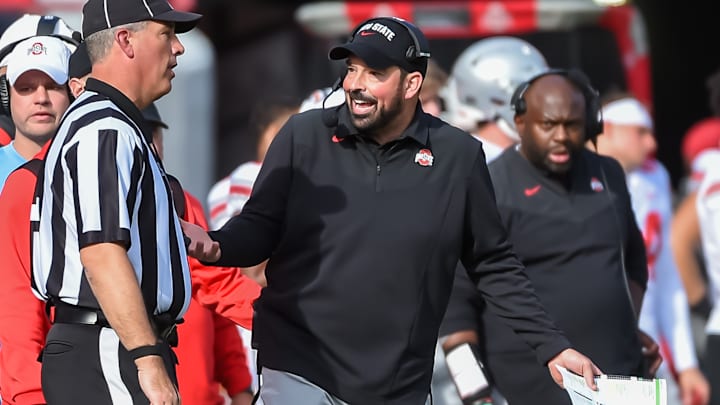Nebraska knew it would be facing an uphill battle when it traveled to Columbus to face Ohio State. The Buckeyes were coming off a bye week, getting a little extra time to stew over their heartbreaking loss at Oregon and presumably looking to make a big statement once they finally took the field again. The Huskers, meanwhile, just took a 56-7 blasting at the hands of Indiana last weekend. Keeping things competitive into the second half, much less pulling the upset, was going to require a Herculean effort.
But Nebraska and their fans likely didn't realize just how Herculean until the first half got underway. The Huskers weren't just going up against one of the best teams in the country; they were also going up against a Big 10 officiating crew that wasn't exactly beating the "err on the side of helping the big boys" allegations.
Nebraska on the wrong end of multiple questionable calls vs. Ohio State
First came a truly baffling spot decision, in which Nebraska clearly seemed to have picked up a first down ... only for the ball to be marked half a yard short. An automatic review never came, forcing Nebraska to burn its final timeout to stop the clock rather than benefitting from an automatic stoppage with a first down.
This was NOT ruled a 1st down for Nebraska…
— Ben Stevens (@BenScottStevens) October 26, 2024
The play was NOT reviewed.
The clock did NOT stop and the Huskers had to burn their final timeout of the half.
Officiating in CFB is an issue. pic.twitter.com/xI73cmrk3c
And yet, that was arguably not even the worst call on that drive. On third and five from the Ohio State 30, Huskers QB Dylan Raiola overthrow Isaiah Neyor on a deep ball to the corner of the end zone. The ball fell harmlessly incomplete, and it seemed like Nebraska would be content to settle for a field goal. The officials, however, had other ideas: Out came a flag for an offensive pass interference on Neyor, apparently for the crime of giving the Ohio State defensive back an obligatory shove as the ball fell to the ground.
Was this pass interference on offense? 👀 pic.twitter.com/IYxMrK4bFV
— FOX College Football (@CFBONFOX) October 26, 2024
Nebraska rallied to hit the field goal anyway, trailing just 14-6 heading into halftime. But that wasn't about to keep Huskers fans quiet on social media about what they'd just seen.
Big 10 refs???? That's a horrible call!!! Ohio state doesn't need help!!
— Aaron Davis (@acdavisco) October 26, 2024
The refs in the Nebraska-Ohio State game have completely botched the last minute hand a half of this game.
— Jamie Plunkett (@FrogPreacher) October 26, 2024
Embarrassing.
Is there some grand officiating conspiracy afoot? Of course not. But it's harder and harder for the conference to build trust when its officials keep making decisions like this, especially when they benefit its more prominent members.
